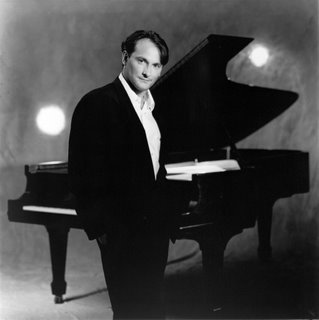 This review appeared in an ever so slightly edited version in the Washington Post on November 21st as "Radiohead a la O'Riley: Transcribed & Transformed."
This review appeared in an ever so slightly edited version in the Washington Post on November 21st as "Radiohead a la O'Riley: Transcribed & Transformed."Pop/Rock music and ‘Classical music’ rarely converge in the concert hall, or if they do, often to very modest results. String quartet tributes to Metallica or the Berlin Philharmonic tackling Scorpions ballads tend to emerge at the lowest common denominator of both styles, which is very low indeed. But there are exceptions, and Christopher O’Riley’s piano transcriptions of Radiohead songs are among them. In his Sunday recital at the Kennedy Center’s Terrace Theater, WPAS presented them to a crowd that looked three quarters Black Cat, one quarter Hayes Series – covering the age spectrum from seven to seventy.
Radiohead has found admiration with an unusually wide spectrum of listeners: From Pop to Grunge to Alternative to Jazz and Classical aficionados, there is something for anyone, if not everyone, to be found in their music. Theirs is music that will often elicit respect before passion. I know an opera singer who happily proclaimed their album Kid A to be “Wagner for our generation”. Classically trained pianist and host of NPR’s classical music show “From the Top” Christopher Riley must feel similarly and has transcribed many of the complex Radiohead songs for piano.
There is so much going on in songs like “Motion Picture Soundtrack” and “Like Spinning Plates” that a transcription is necessarily also a reduction and reinvention. The ambiguous chromaticism of Radiohead seems to have the most appeal to O’Riley as he meanders from chord to chord; at least more of it survives than the (uneven) rhythmical pulse of the originals. If “Air Bag” (with a touch of Liszt!) and “No Surprises” stood out as particularly successful, much of the rest became a mellow mélange of subtly jazzy improvisations and miniatures, all enjoyable in their own right. Whereas “Knives out” morphed into a Windham Hill song, Tom Yorke’s “Cymbal Rush” worked its way to a very satisfying climax.
The first half of the recital featured O’Riley’s latest project: Transcriptions of work by the late singer/songwriter Elliot Smith. The dense, wild ramble of “Coast to Coast” reminded, at best, of late McCoy Tyner. Only “Stupidity Tries” and “Cupid’s Trick” were of similar intensity. The eleven other songs were more tranquil and became correspondingly more pleasant, even if they took on a lulling, casual sameness in their piano-guises. At their best, they shed new light on familiar work, at their worst they sounded like soporific Keith Jarrett.
The crowd, quieter than at most purely classical recitals, listened intently and applauded politely between songs, before going wild after the last Radiohead transcription. If even just a part of WPAS’ goal was to make a new, younger crowd more familiar with their concerts at the Kennedy Center, it should be counted a smashing success.